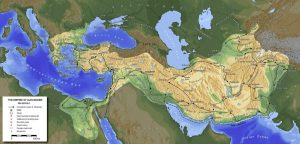When Philip II died of assassination in 336 B.C., Alexander was immediately proclaimed the new king. He quickly eliminated any threats to his new authority and strengthened his grip on the Greek cities that were now under Macedonian command. With these matters settled, he set his sights on a colossal undertaking that his father had been planning for — the invasion and subjugation of the powerful Persian Empire.
Alexander succeeded and then made use of the political disarray in Persia. He then broadened his territories past Persia and extended his command into Syria, Mesopotamia, Egypt, Asia Minor, and Bactria. In these territories, Alexander did not aggressively attempt to alter the conquered people’s way of life. It was characteristic of Alexander that although he tried to spread Greek culture to conquered peoples, he did not require his officials to force it on them. He had a vision of cultural diffusion and synthesis but not the imposition of one people’s way of life over another. Alexander tried to blend the culture of the ruling classes of the conquered people with that of the conquerors. He promoted marriages between his soldiers and the daughters of the peoples they subjugated.
Even in his armies, Alexander allowed Persians to fight alongside Greek soldiers. He trained Persians in the Macedonian military-style, absorbed them into the ranks, and thus helped in increasing his army’s numbers. Alexander even absorbed some aspects of Persian court rituals, to which his officers reacted unfavorably, saying that these were sacrilegious. But to Alexander, as long as the trade routes were able to transport his troops’ food and supplies, he was satisfied. This is what separated Alexander from the conquerors that lived before him. All this may seem to show that Alexander was a lenient ruler, but he was not. He was adaptable, but when uprisings and rebellion threatened his authority, he responded with ferocity.
Alexander established around 20 cities that carried his name, and most of these cities were towards the east of the River Tigris. The most important and prestigious among Alexander’s cities was Alexandria in Egypt, which became a busy Mediterranean city. Alexander’s cities not only operated as crucial posts along trade routes but also as military bases established in strategic locations. The cities did not immediately flourish but were primarily used only for basic trade and, more importantly, as military command posts. After Alexander’s death, Greeks living in these cities fled back home. However, as the years went by, and especially in the period after Alexander’s time, local and Greek peoples eventually settled in these cities. As people needed to be comfortable in their communities, public buildings rose in these cities, and commerce and trade prospered.
Soon, Alexander’s broad vision of world unification turned to India. He marched his troops into the great land and defeated kingdoms that opposed him along his way. Alexander led his army even further, planning to conquer lands that lay beyond the Ganges River. When he and his army neared the Ganges, his exhausted men expressed fears that they might face other massive armies. They had been tired of fighting and had been longing to see their wives, children, and parents. As a result, Alexander led his army back home, but he became ill with a fever and died in 323 B.C. He was just 32 years old, and his empire occupied three continents and covered almost five million square kilometers. He was the king of Macedonia, the master of all Greece, the king of Persia, and an Egyptian Pharaoh. He had accomplished so much and conquered so far in just 13 years since succeeding his father on the throne.
